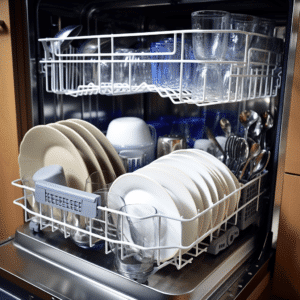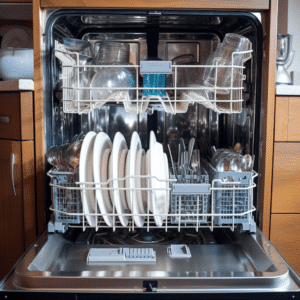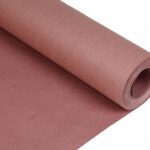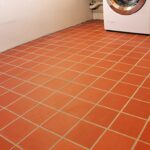Does your dishwasher leave a white chalky residue on your dishes? This is a common problem, but it’s pretty easy to fix. Read on and learn how to prevent a chalky residue from building up on your dishes and glasses.
What is the white chalky residue?
The white residue you’re seeing is calcium that has built up in your dishwasher over time. This can happen even if you regularly use a rinse aid because it’s the water itself, not the dishes, that’s being coated with calcium.
Table of Contents
My dishwasher leaves a white chalky residue: Why?

If you’ve noticed that your dishwasher leaves a white film on your glasses and dishes, you’re not alone. This is a common problem, but there are some potential fixes. Here are some possible causes of the problem:
Hard water: Mineral buildup from hard water can cause this problem. If this is the case, you’ll probably notice that the film builds up over time.
Improper loading: Using too much detergent or placing dishes in the wrong location can cause a white residue to build up on them during the cycle.
Detergent buildup: If there’s leftover detergent in the soap dispenser, it can turn into a gummy paste that leaves a white film on your dishes. Just clean out the dispenser periodically to avoid this problem. High-efficiency dishwashers need special detergent.
What can You do to prevent the Dishwasher from Leaving Chalky Residue?
There are several possible causes of white residue on your dishes after they have been cleaned in the dishwasher. Each requires a slightly different solution.
Here are some steps to take to correct the problem:
Check Your Water Softener Settings
The ideal level of hardness for the dishwasher is around 100 ppm (parts per million). If your water comes from a well or other source without treatment, it may be too hard. In that case, you’ll need to invest in some equipment or services — either a water softener or a dishwasher with its own built-in water softener.
Check Your Water Temperature
If your water is not hot enough, it may cause film and spots. To test this, fill a glass with very hot tap water, then place a candy or meat/dishwasher thermometer in the glass. If the temperature is below 120°F, either turn up your water heater or install a booster heater under your sink.
Use vinegar
Take a cup of vinegar and run your empty dishwasher through a normal cycle. Vinegar is great at cutting through grease, dirt, grime, and mineral deposits. If you have hard water, this step will greatly improve the effectiveness of your dishwasher in the future.
Vinegar is acidic, which helps keep mineral deposits from accumulating on your dishwasher’s heating element and pipes. It’s also an effective way to clean out any existing deposits that have built up.
Use Hot Water for Washing and Rinsing
When filling the tub for washing and rinsing, open the hot water faucet first until you feel the water getting hot. Then turn on the cold water until you reach the proper temperature. The temperature at the faucet should be about 120°F.
Reduce the Amount of Detergent You Use
Over time, the minerals in tap water will build up in the detergent and get deposited on dishes. If there are more minerals than can dissolve in the rinse cycle, they’ll dry out as white residue. Try reducing the amount of soap you use per cycle until this stops happening.
Use a Rinse aid
Rinse aids are a type of soap but different from dishwasher detergent. They are not meant to be used as an alternative to detergent, and they do not get dishes clean. Instead, they act as a drying agent which helps prevent spots from forming on glassware and silverware after being washed in the dishwasher.
The Effects of Hard Water on Your Dishwasher
Hard water, the result of high mineral content, is troublesome for a number of household uses. It can clog filters in your water heater, block plumbing lines, and rust fixtures. But beyond these and other issues, hard water is also trouble for your dishwasher.
Hard water can leave a white chalky residue on dishwasher nozzles and spray arms. Hard water is defined as water that contains higher amounts of dissolved minerals like calcium and magnesium. These minerals are responsible for the white film you might notice on your faucets, toilets, or sinks.
Hard water is not the kind you want when it comes to cleaning your dishes. The effects of hard water on your dishwasher are white film coating, poor performance, slow drain cycles, and foul smells.
Let’s explore how to prevent hard water buildup from clogging your dishwasher.
How to Prevent Hard Water Buildup on Dishwasher

If you live in an area with hard water, you probably have a water softener in your well. This device uses electricity to reduce the hardness of the water and make it more acceptable for household use. As you might imagine, though, the system can’t handle all the hard water in your well.
If your system is already working as designed, you’ll need to take action before hard water buildup stops it from doing its job. The best way to prevent problems is to keep your pipes free of mineral buildup and run your dishwasher at least once per month with a full load of dishes.
The best way to reduce the amount of coating that ends up on dishes is to give them a good scrubbing before putting them in the dishwasher. This can be done by running hot water through the machine for about 10 minutes before each load and then adding just enough detergent to get rid of any leftover food bits or stains.
The next step is to use a dishwasher detergent in your dishwasher. Dishwasher detergents absorb the minerals that are left behind after washing dishes, keeping them out of the machine altogether. They also keep the pipes free of calcium deposits, which would otherwise cause some serious damage if left alone.


